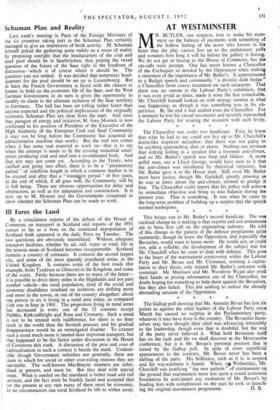AT WESTMINSTER M R. BUTLER, one suspects, rose to make his
state- ment on the balance of payments with something of the hollow feeling of the actor who knows in his heart that the play cannot live up to the preliminary puffs and wonders how long it will be before the gallery is hissing. We do not get to hissing in the House of Commons, but the cat-calls were prompt. One has never known a Chancellor of the Exchequer so derided by the Opposition when making a statement of the importance of Mr. Butler's. It approximated to a Budget speech and customarily " a divinity doth hedge " a Chancellor from coarse treatment on such occasions. That there was no venom in the Labour Party's exhibition, that it was even jovial at times, made it none the less remarkable. Mr. Churchill himself looked on with strange surmise at what was happening, as though it was something new in his ex- perience. By the end it had nettled even the Chancellor. For a moment he lost his casual unconcern and severely reproached the Labour Party for treating the occasion with such levity. * * * * The Chancellor was under two handicaps. First, he knew that what he had to say could not live up to Mr. Churchill's doom-like trapdoor metaphor; that there was not going to be anything approaching alert or alarm. Nothing can produce that sinking feeling in a speaker like a foreseen anti-climax, and so Mr. Butler's speech was limp and lifeless. A more artftil man, say a Lloyd George, would have seen to it that the anti-climax was smothered by rhetorical virtuosity, but Mr. Butler gave it to the House neat. Still, even Mr. Butler must have justice, though Mr. Gaitskell, greatly amusing as he was -at times about the anti-climax, seemed to grudge it him. The Chancellor could report that his policy will achieve its immediate objective and bring us into balance during the present year. That is something. It was when he came to the long-term problem of building up a surplus that the speech seemed inadequate. * * * * This brings one to Mr. Butler's second handicap. The one cardinal change he is making is that exports and not armaments are to have first call on the engineering industry. He told of this change in the pattern of the defence programme quite summarily, though he knew the Opposition, and especially the Bevanites, would want to know more. He would not, or could not, add a syllable; the development of the subject was for Mr. Churchill when he came to deal with defence. This goes to the heart of the rearmament controversy within the Labour Party and Mr. -Bevan and Mr. Crossman, scenting a capitu- lation to their thesis, only treated Mr. Butler's reticence with contempt. Mr. Morrison and Mr. Woodrow Wyatt also tried their hands at prising information out of the Chancellor, no doubt hoping for something to help them against the Bevanites, but they also failed. This did nothing to reduce the already abounding sarcasm of the Opposition: * * * * The Gallup poll showing that Mr. Aneurin Bevan has lost six points as against the other leaders of the Labour Party since March has caused no surprise in the Parliamentary party, whatever it may have done in the country. The Bevanites them- selves may have thought their chief was advancing irresistibly to the leadership, though even that is doubtful, but the rest of the party never believed it. What hold Bevanism itself has on the rank and file we shall discover at the Morecambe conference, but it is Mr. Bevan's personal position that is raised by the Gallup poll. In spite of some superficial appearances to the contrary, Mr. Bevan never has been a darling of the party. His brilliance, such as it is, is suspect and his waywardness is feared. When, oak Wednesday, Mr. Churchill was justifying " the new pattern " of rearmament on the ground that rearmament must rest upon a sound economic foundation he anticipated any exultation of Mr. Bevan's by loading him with compliments on the part he took in launch- ing the original rearmament programme. H. B.


























 Previous page
Previous page